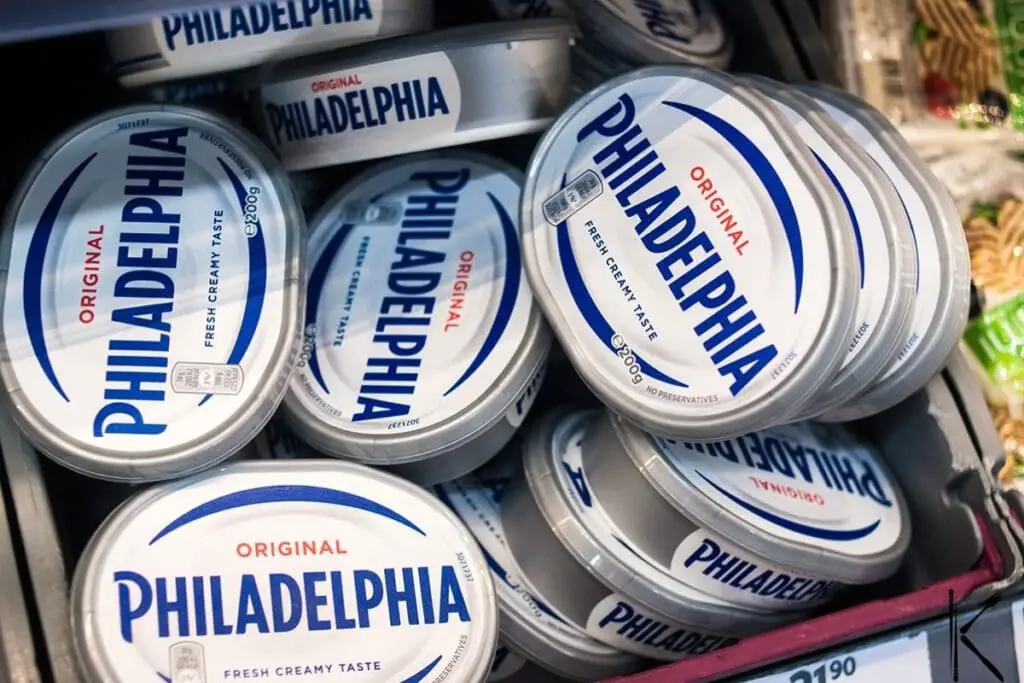In a nutshell: Yes, cream cheese can go bad over time. The shelf life of cream cheese depends on whether it’s unopened, opened, or frozen.
If you opened Philadelphia cream cheese a few days ago and you’re wondering if it’s still correct, you’re in the right place. We bring you everything you need to know about the durability and perishability of cream cheese.
Mostly breakfast is unthinkable without some kind of cream cheese. It goes well with bread or as a base for a sandwich, and children, as well as adults, eat it equally. This is why often we have five or ten boxes of Philadelphia cream cheese in the fridge. And now comes the question, how long does cream cheese last? Do you necessarily have to throw it in the trash if it has expired? How long does it last after you open it, and how do you even recognize that the cheese is spoiled?
The great thing is that dairy products generally give pretty clear signs of spoilage, so you can hardly be confused. The bad thing is that most dairy products can cause indigestion, so be especially careful if you suspect spoilage. Here’s what you need to know.
How Long Does Cream Cheese Last?
Like all other dairy products, fresh cream cheese will spoil over time. The rule regarding cheeses is that the harder they are, the longer they last. Thus creamy versions and soft cheeses last significantly shorter than hard, compact cheeses. Still, you don’t have to rush to throw cheese in the trash the same day it expires.
Manufacturers will put clear guidance for you through the expiry date written on the package. Be aware that not all cream cheese last equally. There can be varieties regarding content. Flavored cream cheese or reduced fat cream cheese can sometimes last shorter than regular ones due to the presence of other food substances or reduced fat.
Unopened cream cheese
If the cream cheese is originally factory packaged and you haven’t opened it yet, chances are it will last at least a week, and maybe two to three, after the expiration date. So if you have relatively recently expired cream cheese in the fridge, open it and check the quality. If everything is fine, feel free to consume it without fear. Cream cheese container usually holds excellent quality.
Opened cream cheese
Once you have opened the cream cheese packaging, the decay process begins. Regardless of the shelf life written on the box, open soft cheese will probably last up to a week, a maximum of ten days. Provided, of course, you keep leftover cream cheese in the fridge and not in the warm. One more thing, properly stored foil wrapped cream cheese will have a better chance than poorly packed one.
Frozen cream cheese
If you bought a large package and know you will not use it within the recommended period, you can decide to freeze cream cheese. This will extend its durability by about two months. And all you have to do is leave it in the fridge overnight to thaw. In the morning, it should be completely ready for your breakfast. Thawed cream cheese will be the same as the fresh one.
Can Cream Cheese Go Bad?
Cream cheese will certainly spoil within a while. You will notice that different types have different expiration dates. This is because they are treated differently, so some may last a little shorter than others.
Here are the most common indicators and how to tell if cream cheese is bad.
Sign 1: Smell is wrong
The smell can be an indicator of spoiled cream cheese when the spoilage process has already progressed. You will hardly notice it early, so focus on the fragrance. So if you sense a sour and strange smell, you will know that the product is spoiled.
Sign 2: Mold is present
Mold can appear on open cream cheese, especially if you accidentally insert foreign substances into it with a knife. Dairy products do not tolerate other foods or dirt well because bacteria grow very quickly. You may also notice yellowish stains that may not look like an alarm right away but are definitely a sign to throw cheese in the trash.
Sign 3: Taste is unusual
The last test is always the taste. If you are not sure about the look or smell and if everything is okay, try a small amount and taste it. If it doesn’t seem okay, spit it out and throw it all away.
What Is The Best Way To Store Cream Cheese?
It is very important that you do not expose the cheese to unfavorable conditions because the bacteria in dairy products grow much faster than in other food. So be careful not to make a purchase and then drive for a few hours keeping the cream cheese in the warm car, for example.
Tip 1: Keep in the fridge
Cream cheese must be refrigerated whether it is open or not, and there is no exception. In the heat, the cheese will spoil very quickly. Therefore, be careful when carrying cream cheese to warm picnics. Don’t leave cream cheese sitting on the counter for too long.
Tip 2: Avoid keeping it open
Try to keep the box of cream cheese without the lid as short as possible. Take the amount you need and cover. The cheese will surely dry out sooner in the air, and an environment for negative bacteria will be created.
Tip 3: Use a clean knife
Always use a clean knife or other cutlery that you use. The spoilage will start quickly if other foods get into the cream cheese.
FAQs
How can you tell if the cream cheese is bad?
You can tell if cream cheese is bad by checking for an off smell, mold growth, changes in texture, or unusual discoloration. If the cream cheese has a sour or rancid odor, visible mold, or an altered appearance, it’s best to discard it.
What happens if you eat expired cheese?
Eating expired cheese, especially if it’s significantly past its expiration date or shows signs of spoilage, could potentially lead to foodborne illness due to the growth of harmful bacteria. It’s safer to avoid consuming cheese that is visibly moldy, has an off smell, or an unusual texture.
What does expired cream cheese taste like?
Expired cream cheese can develop a sour, off taste that is noticeably different from its usual creamy and mild flavor. If the cream cheese tastes tangy, rancid, or unpleasant, it’s likely past its prime and should be discarded.
How long can cream cheese last in the fridge?
Cream cheese can typically last for about 1 to 2 weeks in the fridge after opening, when stored in an airtight container. It’s important to check for any signs of spoilage, such as an off smell, mold growth, or changes in texture, before consuming.
Conclusion
If you bought more boxes of cream cheese than you need, you would most likely be able to consume it for another week or two after the expiration date. Some say that cheese can be good, in the right conditions, even three weeks after expiration, but we would be careful with that prognosis and certainly pay extra attention to the signs of spoilage.
When more time has passed, be sure to toss the cream cheese in the trash regardless of whether you notice signs of spoilage. Dairy food can cause digestive and health problems, so it is better to be safe than sorry.
See more:









